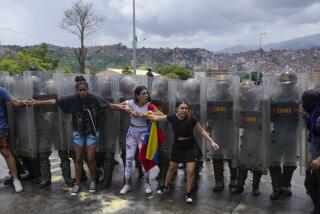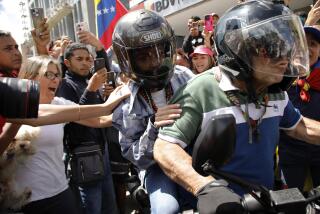Hundreds of thousands in Iran protest vote result
- Share via
TEHRAN — Hundreds of thousands of Iranian protesters defied authorities Monday and marched to Tehran’s Freedom Square, as the Islamic Republic’s supreme leader ordered an investigation into allegations of vote fraud, a move the opposition described as little more than an attempt to dampen anger over the reelection of President Mahmoud Ahmadinejad.
Iran’s supreme leader, Ayatollah Ali Khamenei, ordered the Guardian Council, which is filled with his own appointees and led by a hard-line cleric close to Ahmadinejad, to examine challenger Mir-Hossein Mousavi’s claims of vote fraud. Khamenei’s order came hours before the march, amid a days-long buildup of tension.
Days after Khamenei blessed the election of Ahmadinejad and urged Iranians to rally behind the president, the spokesman of the Guardian Council urged Mousavi’s supporters to wait for the “final results” of Friday’s election until after the fraud investigation, which will begin today.
“My request to the dear candidates and their supporters, who are trying to voice their objections while respecting the law and ethics, is to bear with us,” council spokesman Abbas-Ali Kadkhodai said in a live round-table discussion on television Monday night. “We will investigate and announce the result. The final result will be the one announced by the Guardian Council, which everyone should hopefully accept.”
His call for patience came as gunfire from a pro-government militia base adjacent to the demonstration killed one person and injured others, news agencies reported. State radio announced today that seven people were killed after trying to “attack a military site,” in reference to a clash between semiofficial pro-government militiamen and protesters after the demonstration.
The crowd -- estimates of which ranged to more than 1 million -- defied Interior Ministry warnings broadcast on state television and radio that anyone showing up would be beaten or worse, and even ignored Mousavi’s last-minute call to cancel the event.
The protesters found out about the rally despite a media clampdown that brought the shuttering of numerous opposition websites, including those linked to Mousavi, the jamming of satellite news channels and the shutdown of text messaging systems.
In an attempt to help keep information flowing, a Twitter co-founder wrote in a blog Monday that the company had delayed an important maintenance operation.
Pro-Ahmadinejad demonstrators hurled eggs at the French Embassy on Monday, attempting to link the West to the unrest surrounding the election results.
President Obama said his administration would continue to seek to negotiate with Iran’s leaders.
“I am deeply troubled by the violence that I’ve been seeing on television,” Obama said in Washington. “I can’t state definitively one way or another what happened with respect to the election. But what I can say is that there appears to be a sense on the part of people who were so hopeful and so engaged and so committed to democracy who now feel betrayed.”
Khamenei has for years tried to put his own religious ultraconservative faction in charge of all branches of government. He marginalized not only the nation’s secularists but reformist and pragmatist leaders who were pillars of the Islamic Revolution, risking a backlash by barring huge swaths of people from political power.
There were few signs that the unrest would let up. In the crowd, people passed information about another gathering today in Vali Asr Square, in central Tehran. Mousavi supporters also called for a general strike today.
The massive, diverse gathering refuted the charge by Ahmadinejad supporters and some Western analysts that Mousavi’s support was drawn from the wealthy and educated in northern Tehran.
In the crowd, women in flowing black chadors mingled with factory owners. College students wearing headbands and ribbons of green, the color of the Mousavi campaign, walked side by side next to government employees with salt-and-pepper hair. Bazaar laborers in black T-shirts and motorcycle deliverymen with grime on their fingers waved their hands in the air alongside elegantly coiffed women sporting designer sunglasses.
They came tentatively at first, worried that security forces would crack down harshly. Authorities shut down the cellphone network in the area.
As demonstrators arrived, they called friends and relatives from pay phones to drive to nearby streets, park and join the gathering.
“I am fed up with the rigging of votes,” said Nargess Hassanpour, a 24-year-old architect. “I had never voted until last Friday. I am here and I march toward Azadi [Freedom] Square as far as I can reach, and let come what may.”
From adjacent office buildings, supporters waved and cheered, holding up pictures of Mousavi, as passing cars, taxis and minibus drivers honked in support.
The pro-government Basiji militiamen stood along the sidelines, appearing stunned by the magnitude of the crowd. They have become the scourge of the Mousavi supporters after fighting demonstrators for two nights and storming Tehran University on Sunday night, injuring dozens of students.
University activists alleged that the Basiji killed five students as they stormed the campus to quell a demonstration. The school’s chancellor confirmed the attack but did not mention the deaths.
By 5 p.m., a continuous flood of people surged from west to east toward the expansive Freedom Square, nearly filling the roadway as well as the surrounding green space, with more demonstrators pouring in from all directions.
“Rockets, tanks, Basiji no longer have any effect on us!” they chanted, updating a popular slogan from the 1979 Islamic Revolution.
They came in swarms along the miles-long stretch leading from Revolution Square into Freedom Square, and from other streets, pouring in a nonstop stream, blocking traffic along nearby highways, where people in stopped cars began waving.
“Mousavi! Mousavi! Get our votes back!” they chanted in support of the 67-year-old former prime minister who showed up at the rally, along with other prominent reformist figures.
“If I died today it would be perfect,” said Hossein, a 60-year-old retired schoolteacher, walking through the crowd with the help of a cane. “The nation of Iran has woken up.”
There were unconfirmed reports of large-scale protests in Shiraz and Esfahan, in central Iran, and Tabriz and Orumieh, in the mostly ethnic Azeri northwest, which is Mousavi’s birthplace.
As night fell, people ascended to their rooftops and chanted “God is Great!” in what is becoming a nightly ritual of protest against Ahmadinejad’s reelection.
Most Iran experts do not expect the ultraconservative Guardian Council to revoke the results.
The council has the power to vet laws and candidates for fealty to Islamic principles. Led by the conservative 83-year-old Ayatollah Ahmad Jannati, it’s the same powerful body of jurists that barred thousands of moderate candidates from running in 2004 parliamentary elections and allegedly refused to grant permission to thousands of election observers from the campaigns of reformist candidates from monitoring voting stations in last week’s election.
Khamenei’s decision to review the vote followed a late-night meeting with Mousavi, who is a cousin, in what observers described as a tactical measure to buy time in the hopes that Mousavi and his supporters would cool down.
“The way people came out today after he announced this, nobody believes it’s in good faith, because they have lost trust in him,” said Ziba Mir-Hosseini, a professor of Middle East studies at the University of London.
Analysts said they assumed the protest would serve as a bracing shock to the country’s Islamic establishment.
For years Khamenei and commanders of the Revolutionary Guard have openly warned of the West trying to use Iran’s budding constellation of civil society groups to foment a “velvet revolution” of the style that swept away authoritarian regimes in Eastern Europe.
The intensified outpouring of anger followed Ahmadinejad’s triumphant speech and news conference Sunday in which he labeled his opponents weeds and likened them to angry soccer fans leaving a stadium. Many protesters said the insults were the last straw.
--
Mostaghim is a special correspondent.
More to Read
Sign up for Essential California
The most important California stories and recommendations in your inbox every morning.
You may occasionally receive promotional content from the Los Angeles Times.










